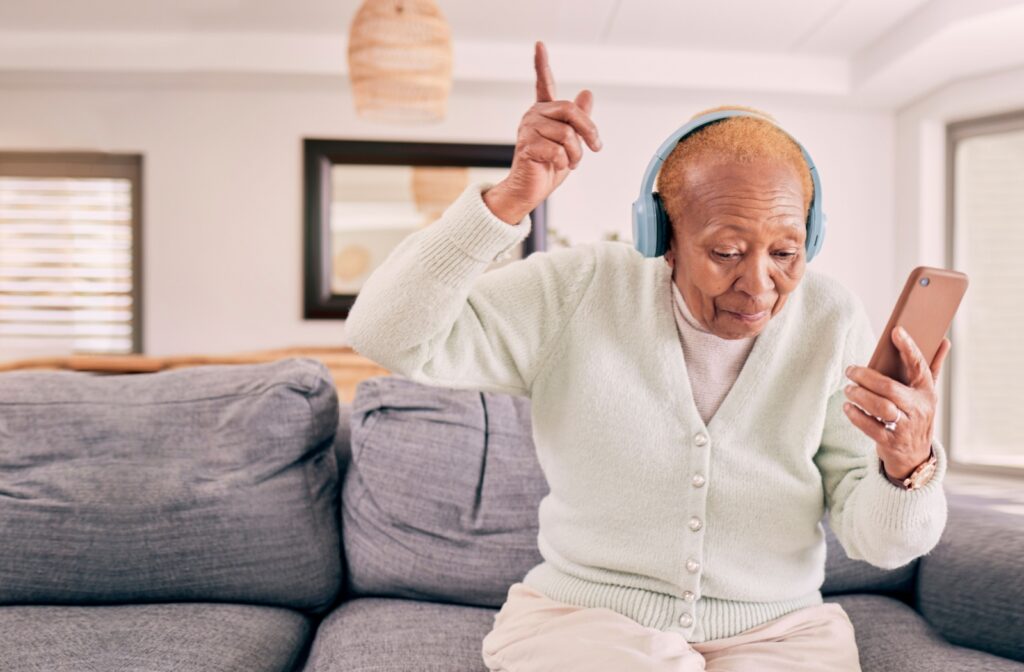Key Takeaways
- Music serves as a powerful connection to memories and emotions, particularly for those in memory care.
- It fosters communication and social interaction, enhancing overall well-being within memory care communities.
- Familiar melodies can improve mood and reduce feelings of anxiety, offering comfort and security.
- Personalized playlists and group music activities create engaging and enjoyable experiences that celebrate individual life stories.
- Integrating music into daily routines promotes a sense of belonging and joy among community members.
The Power of Music in Memory Care
Ever hear a song on the radio and find yourself transported back in time? A catchy tune from your teenage years can bring back the sights, sounds, and feelings of a specific moment with surprising clarity.
That powerful connection between music and memory is more than just a feeling—it’s a pathway to joy, communication, and connection. The power of music for people with dementia is truly remarkable.
Music plays a profound role in memory care by tapping into deep-seated emotions and memories, creating opportunities for social connection and brightening a person’s day, especially within a supportive memory care program.
How Music Connects to Memory and Emotions
Think about the songs you danced to, the anthems of your youth, or the melodies that filled your home. Music is deeply woven into the fabric of our long-term memories. Even when some experiences feel just out of reach, a familiar tune can act like a key, unlocking vivid feelings from the past. According to the National Institute on Aging, engaging in creative arts can create paths to healthy aging.
This is why music is such a wonderful part of a supportive memory care program. It can serve as a bridge to communication and positive emotions. In our vibrant community, we see how a simple song can spark a smile and create a beautiful moment of connection.
The Social and Emotional Benefits of Music
Music is so much more than background noise—it’s a way to connect and enhance well-being. In a lively senior living community, music helps create an atmosphere buzzing with warmth and energy. It brings people together in wonderful ways.
Fostering Communication and Connection
Music gives everyone a unique way to express themselves. Singing along to a classic favorite can spark conversation and laughter. Even tapping a foot or clapping to a rhythm is a powerful form of non-verbal expression and engagement.
Shared musical activities help build strong friendships among neighbors. It creates a beautiful sense of belonging and shared joy. Everyone has a voice in our choir.
Improving Mood and Reducing Agitation
A familiar melody can feel like a warm hug. Listening to favorite songs can help soothe feelings of anxiety or agitation. It often replaces those feelings with a sense of calm, happiness, and security, providing a gentle way to reduce feelings of anxiety.
Ways Music Is Used in Memory Care Communities
We love weaving music into our daily life in creative and engaging ways. These activities are designed to be fun and supportive for everyone, from those needing a little extra help with Assisted Living to people receiving more focused memory care. It’s all about finding what brings each person joy.
Personalized Music Playlists
One of the most meaningful approaches is creating playlists tailored to a person’s life story. Music from their teens and twenties can bring back a flood of positive memories. It’s like creating a personal soundtrack for their life.
Group Music Activities
Getting together for musical fun offers wonderful opportunities for social connection. These group activities are always a highlight of the day and may include:
- Sing-alongs with timeless tunes that everyone knows and loves
- Fun and friendly name-that-tune games
- Listening sessions focused on beloved artists or musical genres
- Live performances from guest musicians that fill our halls with sound
Movement and Music
Combining music with gentle movement is a fantastic way to support physical and emotional health. This could be anything from chair dancing to simple rhythmic exercises. It’s all about helping community members stay active and engaged in a way that feels good.

Tips for Using Music with a Loved One
You can also use music to create beautiful moments with your family member. It’s a simple yet powerful way to connect and share a positive experience together. Maintaining this bond is a key part of effective communication in memory care. Here are a few ideas to get you started.
- Choose familiar tunes. Play songs they adored when they were younger. Ask about the memories associated with them and enjoy the stories that unfold.
- Observe their reactions. Pay attention to how they respond. If a song brings a smile to their face, make a note to play it again. If it seems to cause unease, simply try something different.
- Create a calm environment. Use quiet, soothing music to create a relaxing atmosphere. It can make mealtimes or the end of the day feel more peaceful.
- Sing together. You don’t need a perfect voice to enjoy a song. The simple act of singing together can be a joyful experience that strengthens your bond and provides a positive outlet, which is so important for managing caregiver stress.
Discover a Community That Sings Your Tune
Life-enriching programs, including music-based activities, are a core part of the experience in a supportive memory care community. These programs are thoughtfully designed to celebrate each person’s individuality. They help community members live with purpose, connection, and joy.
When you explore your options, consider a community that offers a full spectrum of living choices, from independent living to skilled nursing. This approach means your loved one can receive just the right level of support. They can do so in a familiar and comfortable setting as their needs evolve.
Here at Juniper Village at Hamilton, we celebrate the rhythm of each unique life. We would love to show you how our community is alive with energy, warmth, and purpose. Contact us today to learn more or to schedule a personal tour.





